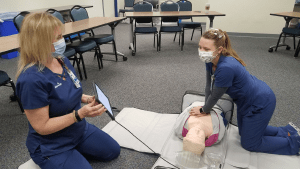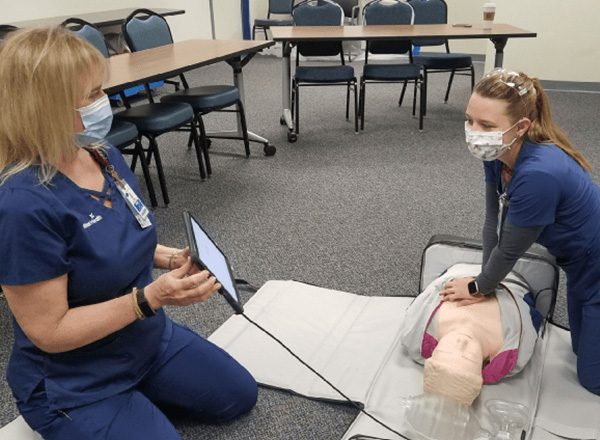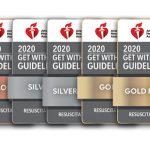Of the various overhead hospital codes, “Code Blue” is one of the most urgent — someone, somewhere is experiencing a life-threatening medical emergency, often cardiac arrest or respiratory failure.
Lindsay Hilado recently responded to a Code Blue while on duty at AdventHealth Tampa in Florida. As the hospital’s Clinical Education Specialist, one of her responsibilities is overseeing the staff’s use of the Resuscitation Quality Improvement® (RQI®) program.
This particular Code Blue call came from a medical surgical unit, which rarely experiences life-threatening events.
“The patient actually went into a respiratory arrest while sitting in a recliner,” Lindsay recalls. “In the few minutes it took me to get there, the nursing staff had already moved the patient safely from the recliner to the bed and started rescue breathing.”
The team’s fast actions prevented the patient from going into cardiac arrest.
Traditional two-year certification vs. quarterly RQI training
“The nurse who led this code doesn’t see them very often,” says Lindsay. “Because she did such a great job staying calm, everything really fell into place. Everybody knew what they were doing and did it so effectively. Every minute was spot on.”
At a post-code debriefing, the team concluded that its quarterly RQI practice prepared them to act quickly and efficiently. Where traditional CPR training calls for recertification every two years, AdventHealth employees basically recertify four times each year using the RQI Simulation Station.
Lindsay explains, “The nurse leading the code has been using RQI for about a year. She said because of RQI she felt she knew exactly what she had to do. The team truly felt that that was it was because of RQI, practicing the simulations and doing rescue breathing every quarter, that they were able to act so fast and save the patient's life.”
She continues, “Had it been the traditional every-two-year CPR training, it might have been a much different outcome.”
Wendi Froedge, AdventHealth Tampa’s Director of Professional Development and Clinical Excellence, received positive feedback from her staff about the recent Code Blue. She says the educators have been getting comments such as, “We just practiced this skill, and now we saw it in real life. And it really helped us respond quicker.”
Wendi points to the consistency of the RQI system as a particular strength. “Because it’s a programmed simulation, there’s no chance of something being left out by a human instructor.”
All-around preparation is key
Another thing Wendi likes about RQI is that it helps users learn to be prepared. She says the program doesn’t leave room for forgetting anything. If it tells you to bag the patient, and you don’t have the bag handy, you lose precious moments in saving the “patient.”
“Something I always preached when teaching new nurses is that you’re responsible for everything in the room,” Wendi continues. “Not just the patient, but everything that touches them… and you’ve got to set your room up.” She loves that the RQI program reinforces this thinking.
The RQI system was installed at AdventHealth Tampa in November of 2019.
“Of course, with any new process there's always going to be some initial resistance to it as users get acclimated,” says Lindsay. But by the first quarter of 2020, there was almost universal buy-in. She believes that the data provided by RQI is what really hit it home with both leadership and staff.
“It is taking people fewer attempts to be successful, because they are more competent in doing chest compressions and ventilations. I think RQI’s sharing of that information has really turned people around to, ‘Wow, this is a great program, because this is measurable data that says we're doing a better job… we're doing a better job at saving lives.’
“And that,” she says, “is awesome.”

Wendi Froedge and Lindsay Hilado of AdventHealth Tampa using the RQI-P GO Simulation Station









